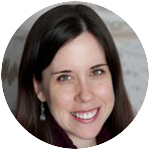
Laura Kelly Fanucci
Tonight the news is swirling from the radio as I cook dinner. Is the world on the brink of war? I stir and fret, trying to pray.
The kids rush in from the yard, dripping snow and mud from their boots. Sweaty and flushed, they fling themselves at the table, hungry and ready to eat.
But I want to serve more than dinner tonight.
After we say grace and the dishes are passed — pasta, vegetables, bread — I start to talk about what’s happening across the globe. Simple terms, but a serious tone.
“Every conflict has many sides,” I explain. “Some people believe our country is called to help others and protect the values we hold. Some people think we need to focus on those who are suffering in our own country.”
I’m careful not to slant either side, because I want them to understand the debate first. I pray and ponder the same questions: How are we called to act in the world?
[hotblock]
“What do you think?” Each child considers, pausing as they chew.
A huge world map hangs next to our kitchen table. We each turn to look at the corner of the world we’re discussing. The colorful borders look simple and clear, but they are the opposite.
The kids are thoughtful, a rare dinner of conversation, not quibbling. They ask if there are people in danger who need help. They argue that you always have to stand up for what’s right.
We’re talking foreign policy and democratic ideals, heady fare for a family with young ones. But I was raised with big conversations served up at dinner time. I love grappling with big questions.
Suddenly one son sits bolt upright, rising from his chair. “But what would God do?”
His question is electric. It transforms the energy in the room. I want to snap my fingers like a poet at a reading: Now we’re cooking, now things are getting good.
This is the question, the ultimate question, the eternal question. If we are people of faith, this arrow must be shot through every decision and action in our small lives and in our vast world.
What would God do? Not a simple slogan or a bumper sticker, but the heart of faith.
Now layers upon layers are heaped upon our table. The common good. Catholic social teaching. Just war theory. What would God do? We keep asking. No easy answers. Always more questions.
Our plates are cleaned and the table is cleared. We have reached no conclusion yet. My prayer bends toward where my conscience leads. “Thy will be done” echoes in my ears.
We wash the dishes and sweep the floor. At the center of the chaos, I catch sight of the map on the wall. The world is calling for our attention, everywhere and always.
The question still haunts me: What would God do?
I keep asking myself the same. My son’s words strike at the heart. In an instant he saw clearly: the whole world and the life of faith laid out before his eyes.
We err when we assume that raising children means having the right answer every time. Faith is not giving easy answers, but asking the hardest questions.
What would God do? What could I do? What should we do?
There are no simple solutions to complex conflicts. But conversations like this are soil for faith’s seed to take root. I want nothing more for my children than to spend their lives asking what God would do and what God would have them do.
May there be more meals like tonight, I pray as the kids head upstairs for bed.
May we bring the most important questions to our table, every time.
***
Fanucci is a writer, speaker, and author of several books including “Everyday Sacrament: The Messy Grace of Parenting.” Her work can be found at laurakellyfanucci.com.
PREVIOUS: Let your (well formed) conscience be your guide
NEXT: Pray with united hearts for peace in Ukraine, Europe, the world


Share this story